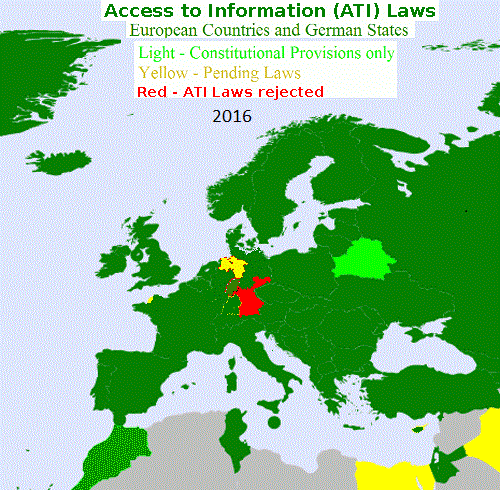- 88 states with
approx. 5.5
billion inhabitants i. e. 78% of the world population give
better access to information then the federal Freedom of Information
Law in Germany (http://www.rti-rating.org/country-data/).
- more than 120 states (http://right2info.org/laws) with more then 5.9 billion inhabitants i. e. 84 % of the worlds population adopted FOI laws or provisions in constitutions. 5 German states with half of the population lack FOI laws.
- The UN Convention against Corruption is ratified by more than 159 states with more then 6,5 billion inhabitants, but not by Germany
Since 2001 I tried to make national authorities in Germany (government, parliaments, politicians, the press, NGOs and courts) aware of the human right of access to information [1] However only the Pirate Party seems to take note of this in Germany.
EU (Parliament, Commission, Agency for Fundamental Rights) [2], Council of Europe (Parliament, Commissioner for Human Rights, ECHR, GRECO) [3,4], International Helsinki Federation for Human Rights (IHF), and OSCE [5] did not help.
Both GRECO (States against Corruption) and HRC (UN Human Rights Committee) [6] did not support the human right of access to information.
UN "Summary of stakeholders' information" of Canada report A/HRC/WG.6/16/CAN/3 mentions access to information: "54.Joint submission 4 (JS4) referred to shortcomings in Canada’s law and policy regarding freedom of expression. JS4 recommended Canada (...) repeal Sections 299-304 of the Criminal Code, which criminalize defamation, bring the Access to Information Act in line with international standards; and recognize a freestanding constitutional right to information."
There are 269 hits (Accessed January 2013) on "Access to Information" in the UPR-Info.org database e. g. freedom of information laws are mentioned for Canada, Azerbaijan, Bahrain, Botswana, Burkina Faso, Cameroon, Cape Verde, Colombia, Cuba, Equatorial Guinea, France, Kenya, Tuvalu, Uzbekistan, and the REPUBLIC OF DJIBOUTI (submitted by ARTICLE 19). UNESCO has recommended Freedom of Information laws to all states reviewed during the 16. UPR session. Austria recommended to Bahrain (A/HRC/WG.6/13/L.4): "Enact a progressive, substantive Freedom of Information law". Djibouti and Ghana got same suggestion.
Will the UN Universal Periodic Review (UPR) [7] support access to information in Germany?
Does anyone have positive experiences with UPR?
Regards
-- Walter Keim Netizen: http://walter.keim.googlepages.com UN-Menschenrechtsausschuss: Deutsche Informationsfreiheits- gesetze in der Kritik: http://t.co/vxdoGCuf Is it possible to enforce access to information in Bavaria? http://wkeim.bplaced.net/files/enforce_access_to_information.html
References:
- Many petitions and complaints to Germany authorities (government, administration, parliaments, courts, NGOs) 2001 to 2012 did not help: http://wkeim.bplaced.net/files/foi-de.htm
- 1. September 2012: EU does not Support the Human Right of Access to Public Documents in member states: http://wkeim.bplaced.net/files/foi-eu.htm
- 24. August 2012: GRECO failed in Second Evaluation Round and must therefore do better in Third Round : http://wkeim.bplaced.net/files/foi-greco.htm
- 7. November 2012: Will OSCE Support the Human Right of Access to Public Documents?
- 31. March 2013: CoE failed to support ATI in Germany: http://wkeim.bplaced.net/files/foi-coe.htm
- In the context of the 106th
CCPR session Human Rights Committee (HRC) did not observe
that the human right of access to public documents is violated in
Germany: http://wkeim.bplaced.net/files/foi-ccpr-de.htm
- Will the UN Universal Periodic Review (UPR) help?: http://wkeim.bplaced.net/files/foi-upr-de.htm
- There are 269 hits (Accessed January 2013) on "Access to Information" law in the UPR-Info.org database e. g. freedom of information laws are mentioned for Canada, Bahrain, Botswana, Burkina Faso, Cameroon, Cape Verde, Colombia, Azerbaijan, Equatorial Guinea, France, Kenya, Tuvalu, Uzbekistan, and the REPUBLIC OF DJIBOUTI (submitted by ARTICLE 19).
- 28. April 2013: The UNESCO submission mentions Freedom of Information laws and decriminalisation of defamation
- 124.22: "Accepted. Before ratifying the United Nations Convention against Corruption, an adaptation of the legislation regarding the criminal offence of bribery of members of parliament is needed. A corresponding draft legislative bill should be submitted by members of the German Bundestag."
- 124.28: (Withdraw reservations e. g. ICCCP): "Accepted. Legal regulations and their implementation already comply with international standards and norms. "
- 124.42: (Align its national legislation with international human rights standards): "Accepted."
- 124.46: "Not accepted."
- 124.49: (control over Office of Youth): "Accepted. Already now it is possible to subject decisions made by the Youth Welfare Office to judicial review."
- 124.145: (supervision of Office of Youth)"Accepted. It is already possible to have decisions taken by the Youth Welfare Office examined by a court to verify their compliance with applicable German law and also with the European Court of Human Rights’ rulings with regard to the provisions of the European Convention on Human Rights."
- 124.169: "Accepted. Human rights education is embedded in state school curriculums. It is constantly reviewed, as is human rights basic and further training in the Federal Police. Additional monitoring is not necessary."
| Subject: | Who will support Germany? |
|---|---|
| Dato: | Wed, 15 Feb 2012 07:51:32 +0100 |
| Fra: | Walter Keim <walter.keim@gmail.com> |
| Til: | 'Foianet' <foianet@foiadvocates.info> |
Germany has to improve the federal FOI law, adopt FOI laws in 5 local states (Bundesländer), ratify COE and UN conventions against corruption and improve transparency of funding of political parties to catch up with Europe, America, OSCE, OECD and BRIC states (see weakness no. 2, 3, 4, 8, 34, 35 and 52 of National Integrity Report Transparency Germany).
Who will support Germany?: http://wkeim.bplaced.net/foi-ngo.htm
-- Walter Keim Netizen: http://sites.google.com/site/walterkeim/ Who will support transparency in Germany: http://wkeim.bplaced.net/foi-ngo.htm http://wkeim.bplaced.net/files/foi-ccpr-de.htm[Freedom of Information] [Petitions] [Human rights] [Homepage]
Colours on picture: dark green: FOIA enacted. Yellow: pending law. FOIA= Freedom of Information Act
